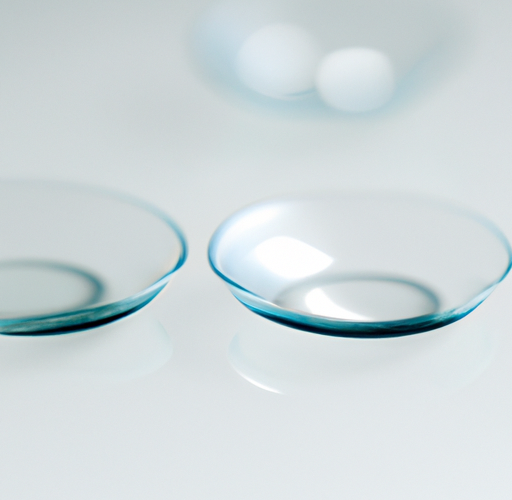Why You Should Take Care of Your Contact Lenses: Understanding Corneal Ulcers
As a contact lens wearer, you may think that it’s perfectly fine to wear your lenses all day, every day. But did you know that contact lens use increases your risk of developing corneal ulcers? In this article, we’ll dive into what corneal ulcers are, what causes them, and how you can prevent them.
What are Corneal Ulcers?
Simply put, corneal ulcers are open sores on the cornea of the eye. The cornea is the clear outer layer of your eye that helps you see by refracting light. Corneal ulcers can be caused by a variety of factors including infections, trauma, and the improper use of contact lenses.
What Causes Corneal Ulcers?
One of the primary causes of corneal ulcers is the improper use of contact lenses. Contact lenses create a barrier between the eye and the environment, which can trap bacteria and other microorganisms against the cornea. This can lead to infections that can cause corneal ulcers.
Another cause of corneal ulcers is trauma to the eye. This can happen when foreign objects, such as dirt or debris, come into contact with the cornea. It can also happen when you rub your eye too hard or wear contact lenses that are past their expiration date.
How to Prevent Corneal Ulcers
Preventing corneal ulcers starts with proper contact lens hygiene. Always wash your hands before handling your contacts and make sure to properly clean and disinfect them after each use. You should also replace your contact lenses regularly, as recommended by your eye doctor.
It’s also important to give your eyes a break from contact lenses every once in a while. This can help reduce the risk of corneal ulcers and allow your eyes to breathe and rest.
In addition, avoiding rubbing or touching your eyes and keeping them protected from the elements can help prevent corneal ulcers.
Don’t Let Corneal Ulcers Ruin Your Vision
While corneal ulcers can sound scary, they are preventable with proper contact lens hygiene and eye care. Take care of your eyes and always follow your eye doctor’s instructions for contact lens use. Your vision is worth it! I do not have eyes, so I do not need to worry about corneal ulcers. However, it is important for human readers to take care of their eyes to avoid any vision problems. Proper contact lens hygiene, giving your eyes a break from contacts, and avoiding rubbing or touching your eyes are some of the ways to prevent corneal ulcers. It is always advisable to consult your eye doctor for any concerns or questions regarding your eye health.
“What are the symptoms of a corneal ulcer caused by contact lens use?”
The symptoms of a corneal ulcer caused by contact lens use may include:
1. Redness and swelling around the eye
2. Eye pain or discomfort, especially when wearing contact lenses
3. Sensitivity to light
4. Blurred or hazy vision
5. Feeling like there is something in the eye
6. Excessive tearing
7. Eye discharge
8. A white or gray spot on the cornea
9. Loss of vision or changes in vision.
If you experience any of these symptoms, it is important to seek immediate medical attention from your eye doctor. Corneal ulcers can lead to serious eye complications if left untreated.
How are corneal ulcers treated?
The treatment for corneal ulcers caused by contact lens use will depend on the severity and cause of the ulcer. Mild ulcers may be treated with antibiotic eye drops, while more severe cases may require oral antibiotics or even hospitalization. In some cases, surgery may be necessary if the ulcer has caused significant damage to the cornea.
It is important to follow your eye doctor’s treatment plan and attend all follow-up appointments to ensure proper healing. It is also important to avoid wearing contact lenses until the ulcer has completely healed to prevent further damage to the eye.
In conclusion, corneal ulcers caused by contact lens use can be prevented with proper hygiene and care. If you experience any symptoms of a corneal ulcer, seek immediate medical attention to prevent further damage to your vision. Always follow your eye doctor’s instructions for contact lens use and care to maintain healthy eyes.

